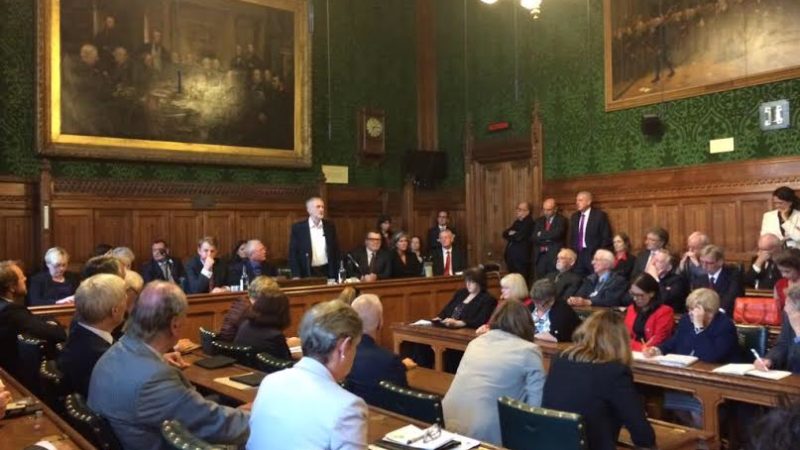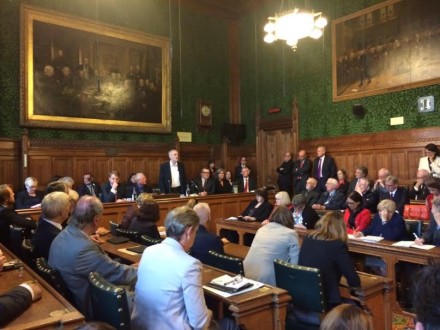

Both Jeremy Corbyn and Sadiq Khan last night told MPs that Labour is not doing well enough to win the next general election – but the party could still win in 2020.
Corbyn was the more upbeat of the pair at the meeting of the Parliamentary Labour Party, telling the MPs and peers that last week’s election results put Labour “in the right direction” towards a majority in four years’ time and that the party’s “recovery has begun in earnest”.
In an unusual move, sections of Corbyn’s address to the PLP was briefed out in advance of the meeting. This meant that some MPs coming from meetings – including several who had been in discussions about their constituencies disappearing in the Government’s boundary review – did not know what was in the Labour leader’s opening remarks despite having been already reported publicly.
This could have been done to try to define the message for a meeting that was expected to be challenging for Corbyn. It was his first PLP since last week’s election and the suspension of Naz Shah and Ken Livingstone over anti-Semitism allegations.
As well as setting out his belief that Labour was progressing, he also encouraged MPs to avoid giving “a running commentary on our party”. However, one backbencher present said they were concerned that the leadership was adopting an “ostrich strategy” by burying its head in the sand over the reasons for both successes and defeats last Thursday.
New Mayor of London Sadiq Khan spoke at the meeting alongside Corbyn. After entering the room to sustained applause, Khan stressed the importance of winning elections, and warned that “there is no such thing as glorious defeat.”
In his opening comments, Jeremy Corbyn said:
“Jon Trickett set us the target of closing the gap with the Tories at the 2015 General Election. Last year we were nearly seven points behind. The projection from Thursday’s results by the BBC and Professor John Curtice shows that nationally we are now a point ahead of the Tories in our national share of the vote.”
Corbyn pointed out that Labour won all mayoral elections, including two gains, held both parliamentary by-elections, made a net gain of three in police and crime commissioners, held councils across the south of England, and “scored the second best result in Wales since devolution”.
But he added: “Let’s be clear. The results were mixed. We are not yet doing enough to win in 2020. This is only the first stage in our task of building a winning electoral majority, attracting voters from all the other parties and mobilising those who have been turned off politics altogether – as we did last week in Bristol and London.
“But overall we have moved in the right direction. And now we have to build on these results.”
He also warned that MPs should be less vocal in their public criticisms of the direction of the party, arguing that it is not what Labour members want. He said:
“We also need to reflect on the impact of what we do and say here on the public outside, across the country. I don’t expect, or even want, blind loyalty, but members and supporters expect us all to focus on taking on the Tories – and for our debates to be focused on policy, not personality.
“Members also tell me that they don’t think Labour MPs should be parading on the media to give a running commentary on our party. If we are on the media we are there to give our verdict on this failed and divisive government, not on each other.
“We need, if not across-the-board unity, then at least respect for each other – and to turn our fire turned on this Tory government, and its forced academisation, tax and disability cuts policies in utter disarray.
“It’s been said in the past few days we need to stop talking about ourselves and engaging with the concerns and priorities of the wider public. I suggest we all follow that advice.”
Sadiq Khan also agreed that Labour is not yet on course for victory, but that a win can be achieved in 2020. However, he also had some veiled criticisms of Corbyn’s leadership, arguing that the party “cannot afford to miss any open goals” and making a point of the importance in winning elections.
The new Mayor of London said:
“The incompetence and internal divisions that we’ve seen from the Government in recent months is reminiscent of the Major years in the 1990s – a Government in decline.
“We cannot afford to miss any open goals. Just like we did then, Labour has a responsibility to hold the Government to account for its failures and show we are a credible government-in-waiting. We are not there yet, but I know with the right approach, Labour can still win in 2020.”
He added: “If this election tells us anything, it is that it is so important that Labour wins elections. When we win we can change lives for the better. There is no such thing as glorious defeat.”
One MP told LabourList that while it was an interesting shift in tone to see Corbyn accept some shortcomings in last week’s elections, there was a general concern that efforts were not being made to understand the results.
The backbencher said they were “worried that the ostrich strategy might be undertaken. Ignoring defeats and reasons behind successes would be a major error, and dismissing results as ‘complex’ also undermines any real attempt to learn from campaigns.”
A spokesperson for Jeremy Corbyn suggested that this was not a view held widely in the room, noting the “incredible enthusiasm about the electoral advances being made”.
They added that “these elections represent a real step forward” and were “part of Labour’s recovery”. “Putting Scotland to one side, we set the target of trying to close the gap with the Tories and achieve a percentage electoral advance on last year’s general election results, and that was achieved.”
“It was clearly an important process in recovery, Labour is advancing, beginning that important shift that will eventually lead to victory in 2020,” the spokesperson said. They also said the results proved that “Labour is now the most popular party electorally in Britain”.




More from LabourList
Government announce SEND reform in schools white paper
SPONSORED: ‘Industrial hemp and the challenge of turning Labour’s priorities into practice’
‘A day is a long time in politics, so we need ‘action this day’’